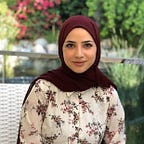Gaza bleeds between these pages
A thick tapestry of history, thought and feeling.
It baffles me, really, how Susan Abulhawa is so skilful when it comes to weaving stories with words. Just words. How does she thread her narrative through and around the tragedies of Palestinians without pricking her fingers? Does she not bleed over the very pages she is writing on?
The Blue between Sky and Water is precisely like a piece of fabric — an inter-generational story she has woven from the warp and weft of characters and events, her language as lyrical as ornamental embroidery. She treats literature like a thobe (a traditional Palestinian garment), interlacing its elements into an extraordinarily intricate pattern.
This book was too much.
By “too much,” I mean it carries too much pain. How can it not when its stories are so saturated by tragic events? After all, this is Gaza, the world’s largest open prison, where everything is too much and — paradoxically — not enough.
Death, disease, loss, poverty, war, fear and terror are plentiful. Kinder Eggs, medical supplies, utilities, electricity, freedom, safety, on the other hand, are sparse.
The story is told by Khaled, the one in the blue between sky and water.
“I feel a kind of stillness, as if my body itself has become a moment of silence.A hollowed-out cave of a life within a life.”
The Blue between Sky and Water by Susan Abulhawa
He recounts his family’s history, how they became refugees in 1947 after Israeli forces burned their village, and how they were subsequently broken in so many different ways. Sixty years later, an American woman returns to the land of her ancestors in an attempt to heal the wounds of Gaza. It turns out, she is more broken than any of them.
In some ways, it is simply a story of exile, loss, and love. In others, it is not simple at all.
“But for most, the landscape of destruction hid the broken parts of them — memories of bombs, fear, and the recently dead — and no one wanted to find those. So, they sat on the peripheries of their own lives, on rocks, huddling around fires for warmth, waiting for time to limp along.”
The Blue between Sky and Water by Susan Abulhawa
When I say “too much”, I also mean in terms of subject-matter. While it does seem to be representative of historical and current events that comprise the Palestinian predicament, there are times when the novel feels compressed— almost like an overstuffed kousa mehshe (a Levantine dish of stuffed zucchini). This is particularly true when it comes to the characterization of Nur, the “American” who returns to Palestine in search of her identity and a place to call home. It left me wondering about the function of exaggeration in traumatic experiences. Perhaps, it is meant to shed light on the universality of pain.
“Life burrowed holes and tunnels in her. It filled her with an immense silence that grew teeth and claws that cut her from the inside.”
The Blue between Sky and Water by Susan Abulhawa
One point that deserves recognition is Abulhawa’s accurate portrayal of superstitions and Arab folklore. The most notable of these supernatural constructs is the djinn, Sulayman, invoked by the family’s great grandmother in times of hardship.
Although I’m not a huge fan of magical realism, Abulhawa seamlessly links the lives of her characters to elements of the supernatural — which also serves to connect the past to the present, transcending time and logic.
Despite — or perhaps because of — these elements of superfluousness, the novel is enthralling.
It is heartrendingly haunting and excruciatingly lyrical. It is everything you never want to experience. It left me asking many questions, but what I couldn’t shake off was this haunting thought: If it is intolerable to read about so much pain, what would it be like to live through it?
From the beginning, fact and fiction and meet on the banks of a river. Here, the reader’s experience is anchored to the bed of reality. It might be a fictitious work of literature, but everything that comprises it, resembles the real lives of Palestinians.
It is everything you never want to experience.
If you read this book, I’ll meet you there, somewhere between sky and water.
